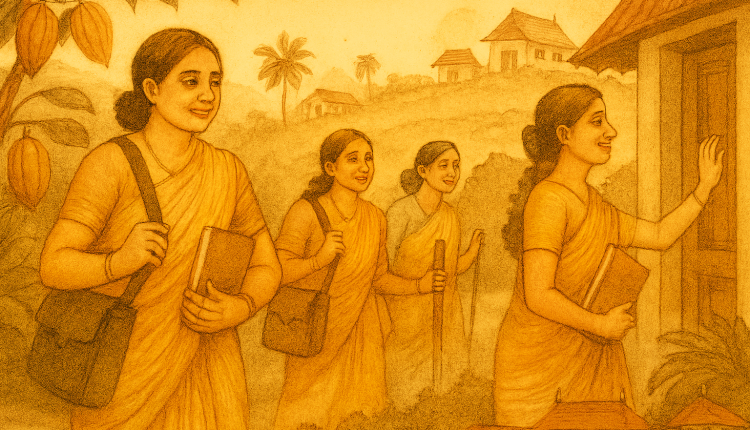Kerala SIR Exercise: Woes of Women Teachers as BLOs: TrekkingTerrains Door-to-Door Conceding Classrooms
By Geetha V P
In the picturesque village of Thalavoor, Kollam district, Suma (name changed), a young lower primary (LP) school teacher, begins her day at dawn, trekking the terrain. Accompanied by her husband, she trudges from house to house, bundles of enumeration forms in hand, verifying voter details under the Election Commission of India’s (ECI) Special Intensive Revision (SIR) of electoral rolls. With young children left less attended at home and her classroom deprived of her physical presence, Suma’s story is not unique—it mirrors the tribulation of thousands of women teachers across Kerala deputed as Booth Level Officers (BLOs). As the enumeration phase kicked off on November 4, 2025, amid widespread political opposition, these women—comprising approximately 90% of BLOs in the state, predominantly teachers—bear the brunt of an exercise criticized as unscientific and burdensome.
The SIR, aimed at purifying voter lists ahead of the 2026 Assembly elections, requires BLOs to conduct house-to-house verification using the 2002 electoral rolls as a base—a decision that has sparked outrage. On the first day alone, over 2.07 lakh forms were distributed, with BLOs like government school teacher Vineetha V.K. in Wayanad’s Kalpetta navigating estate quarters and factories, cross-checking details, addressing voter confusion, and planning multiple visits to cover absentee households. By December 4, BLOs must collect filled forms, affix photos where needed, and upload data via apps, with the draft voter list slated for publication on December 6 and final rolls by February 2026.
The Plight of Women BLOs: Juggling Duties Without Adequate Support
Kerala’s BLO network relies heavily on school teachers, particularly from lower primary (LP) and upper primary (UP) levels, where women dominate the workforce. Deputed for a month-long intensive drive, these teachers face immense physical and emotional strain. Suma’s routine—rushing through villages without breaks, often with family members for support—highlights the gendered nature of this burden. Many women BLOs, responsible for childcare and household chores, sacrifice personal time, leaving young children unsupervised or schools understaffed.
The impact on education is profound. With teachers absent until at least December 6, students in rural and urban schools alike suffer from disrupted classes. In high-range areas like Idukki’s Rajakkad, BLOs trek difficult terrain, preferring immediate form-filling to avoid repeated visits, adding to exhaustion. Vineetha V.K., for instance, deals with vigilant yet confused voters unaware of their 2002 roll details, requiring extra explanations and evening follow-ups when families are home.
Compensation remains a sore point. While the ECI doubled annual BLO remuneration to ₹12,000 and introduced ₹6,000 incentives for SIR in some contexts, teachers argue it’s woefully inadequate for the extra workload—fuel costs, multiple visits, and overtime amid local body election overlaps. No special allowances for women facing safety risks during door-to-door visits or those managing families single-handedly have been announced, exacerbating feelings of exploitation.
Political Turbulence: Unified Opposition opposed to SIR
The SIR has ignited fierce resistance in Kerala, with the state Assembly passing a unanimous resolution against it in September 2025. An all-party meeting chaired by Chief Minister Pinarayi Vijayan on November 5 decided to legally challenge the ECI’s decision in court, labeling it “unscientific and ill-intentioned.” All parties except the BJP backed the move, with the United Democratic Front (UDF) ready to implead. Vijayan criticized the use of 2002 rolls over the updated 2024 Lok Sabha list, warning of mass disenfranchisement ahead of local body polls.
Leader of Opposition V.D. Satheesan and CPI(M) secretary M.V. Govindan echoed this, calling it “anti-Constitutional and anti-democratic.” Fears abound that the revision targets migrants, minorities, or opposition voters, potentially overlapping with local elections and causing chaos. Kerala follows Tamil Nadu in approaching the Supreme Court, highlighting a broader regional backlash against the ECI’s nationwide SIR.
Though teachers’ unions in Kerala have protested other issues, the deputation for SIR has amplified grievances, with indirect backlash through political channels. In contrast to West Bengal, where teachers boycotted BLO training, Kerala’s process proceeds amid directives to avoid local poll overlaps—yet the strain persists.
The maladies of these BLOs are multifaceted: physical fatigue from relentless visits, emotional toll on families, educational disruptions, and perceived inadequacy of compensation. Women BLOs, often from marginalized schedules, face disproportionate hardship without gender-sensitive provisions like risk allowance.
As Kerala heads to court, the SIR underscores a systemic issue—over-reliance on teachers for electoral duties without safeguarding their primary role or well-being. True electoral purity cannot come at the cost of educators’ dignity or students’ futures. The ECI must reconsider timelines, enhance incentives, and explore dedicated BLO cadres to alleviate this gendered burden. Until then, women like Suma soldier on, their dedication unspoken amid a politicized storm.


